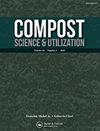辣椒(辣椒)使用有机营养源的生长、水果产量和品质
IF 2
4区 农林科学
Q3 ECOLOGY
引用次数: 14
摘要
摘要:由于有机肥料的稀缺,许多温室蔬菜种植者无法参与有机市场。有机肥料既能(a)满足作物的营养需求,与使用营养液时类似,又能(b)被视为生物、生态或一般意义上的“可持续”。在墨西哥干旱地区的温室条件下,采用了三种不同辣椒基因型的四种不同施肥制度。这三种基因型属于“塞拉诺”变种,来自墨西哥北部的不同干旱地区。根据美国的有机标准,整个作物管理是100%有机的。我们发现,通过用牛粪和玉米废料代谢铁爱胜酵母饲料获得的蚯蚓堆肥能够为品种提供所需的营养,以获得与提供营养液的植物相似的生长和产量。最高产的基因型(Don Diego)表现出以下新鲜产量值:传统营养液、蚯蚓堆肥、日光牛粪和日光家禽粪处理的植株−1分别为1.98、1.84、1.24和1.11 kg。用家禽粪便施肥导致测量的每个生长和产量变量的值较低。然而,对于基因型Don Ramón和Don Vicente,同样的处理显示抗坏血酸的最高值分别为328.6和327.4 mg 100 mL−1。总体结果表明,有机营养来源可能能够满足温室辣椒的需求,作为有机农民的替代品。用蚯蚓堆肥处理在所有植物中表现出总体上最好的行为。本文章由计算机程序翻译,如有差异,请以英文原文为准。
Hot Pepper (Capsicum annuum L.) Growth, Fruit Yield, and Quality Using Organic Sources of Nutrients
ABSTRACT Many greenhouse-vegetable growers cannot participate in the organic market due to the scarcity of organic fertilizers, which are able both to (a) satisfy the crop's nutritional needs similarly to when using a nutrient solution, and (b) be regarded as biological, ecological, or in general terms “sustainable.” Four different fertilization regimes using three different hot pepper genotypes were applied under greenhouse conditions in arid land of Mexico. The three genotypes were of the “Serrano” variety and were obtained from different arid lands in northern Mexico. The entire crop management was 100% organic according to United States organic standards. We found that vermicompost—obtained from the metabolism of Eisenia fetida feed with cow manure plus maize waste—was able to supply the needed nutrients to the cultivars to obtain a growth and yield similar to the plants supplied with nutrient solution. The most productive genotype (Don Diego) showed the following fresh yield values: 1.98, 1.84, 1.24, and 1.11 kg plant−1 for treatments with conventional nutrient solution, vermicompost, solarized cow manure, and solarized poultry manure, respectively. The fertilization with poultry manure resulted in lower values in every growth and yield variable measured. However, this same treatment showed the highest values in ascorbic acid with 328.6 and 327.4 mg 100 mL−1 for genotypes Don Ramón and Don Vicente, respectively. The overall results suggest that organic sources of nutrients may be able to supply the needs of greenhouse hot peppers as alternative for organic farmers. Treatment with vermicompost showed the general best behavior in all of the plants.
求助全文
通过发布文献求助,成功后即可免费获取论文全文。
去求助
来源期刊

Compost Science & Utilization
农林科学-生态学
CiteScore
4.10
自引率
0.00%
发文量
0
审稿时长
>36 weeks
期刊介绍:
4 issues per year
Compost Science & Utilization is currently abstracted/indexed in: CABI Agriculture & Environment Abstracts, CSA Biotechnology and Environmental Engineering Abstracts, EBSCOhost Abstracts, Elsevier Compendex and GEOBASE Abstracts, PubMed, ProQuest Science Abstracts, and Thomson Reuters Biological Abstracts and Science Citation Index
 求助内容:
求助内容: 应助结果提醒方式:
应助结果提醒方式:


